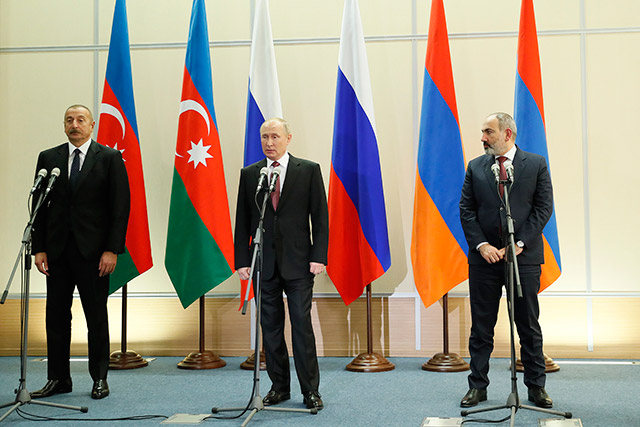What has Baku surrendered in one year? Has the word “compromise” left the diplomatic agenda? Why is there a policy of diplomatic coercion towards Armenia?
Armenian Prime Minister Nikol Pashinyan, Russian President Vladimir Putin and Azerbaijani President Ilham Aliyev summed up the results of a trilateral meeting in Sochi on November 26 after three hours of talks, making statements to the press. Pashinyan called it a “very positive meeting,” noting that the topic of starting the process of delimitation and demarcation is not new, and also reaffirmed the readiness of the Armenian government, which “received a mandate from the people of Armenia to open an era of peaceful development for our country and our region.” In his speech, Pashinyan, of course, mentioned the necessary conditions for security and stability mechanisms and talked about humanitarian issues, but the problem is that Moscow and Baku do not publicly consider these issues on the agenda.
Perhaps in response to the criticism voiced in the Armenian discussions after November 26, the Republic of Armenia’s Ministry of Foreign Affairs spokesperson provided commentary on the Sochi trilateral statement on November 30, stating that “the Sochi statement reaffirms the parties’ commitment to the consistent and unconditional implementation of all the provisions of the November 9, 2020 trilateral declaration. This also refers to the return of prisoners of war, hostages, and other detainees that has not been fulfilled by Azerbaijan so far, stipulated in point 8 of the November 9 statement, and the obligations not fulfilled in other points.” The mention of the November 9, 2020 trilateral statement does not mean that the provisions included in it have been implemented. Moreover, a year after the adoption of the statement, there was no talk about which party had violated what it had signed and which party was not fulfilling its obligations. Why, then, was it not noted in Sochi that the Azerbaijani side did not fulfill certain provisions, violated the rights of the Armenian side, or violated certain provisions of the statement? Why doesn’t the document adopted in Sochi state that Azerbaijani units have invaded the sovereign territory of the Republic of Armenia? What, were they also “hidden” demands of the previous two joint statements, or were they the result of a verbal agreement to extort this or that concession from the Armenian side?…
Read also
The statement of the RA MFA spokesperson also says that the Sochi statement reaffirms the provision of unblocking all transport routes and economic ties in the region registered in the January 11 statement, and once again refutes the propaganda theses on the “corridor” or corridor logic. Why is it that the statement adopted in Sochi does not state that if all the transport routes are opened, they will not violate the territorial integrity of the countries, and the control over those roads will remain under the jurisdiction of that country? Official Moscow, of course, has stated on several occasions that all members of the tripartite working group have agreed that all unblocked and newly created transport routes should operate on the basis of respect for the territorial integrity and sovereignty of the state through which they pass. But it is more important that these records are documented, not just spoken orally. Besides, if official Yerevan emphasizes the need to continue the activities of the OSCE Minsk Group, which at least in the Armenian reality implies that the status of Nagorno-Karabakh should be clarified, why wasn’t it mentioned in the trilateral document in Sochi? Moreover, if official Yerevan is going to clarify the border with Azerbaijan, what will the OSCE Minsk Group do in general? The process of demarcation and delimitation will give Aliyev an opportunity to state that we are defining borders with official Yerevan, Yerevan recognizes the territorial integrity of Azerbaijan. What status of Nagorno-Karabakh, what are you talking about?…
So, noting once more that “we reaffirmed our commitment to the future and consistent implementation and unconditional observance of all the provisions of the November 9, 2020 and January 11, 2021 statements for the benefit of stability, security and economic development in the South Caucasus” is not at all a guarantee for the new manifestations of official Baku. Or every time Aliyev is dissatisfied with something, should Azeri units invade the territory of the Republic of Armenia, provoke border tensions, then demand and receive something from the Armenian side, withdraw, and we accept it as a big manifestation of humanism? Should we rejoice that another illegality was prevented and consider it to be an achievement of Armenian diplomacy?
In other words, a policy of diplomatic coercion is being implemented towards Armenia. A year has passed since the document was published on November 10, but concessions are expected exclusively from the Armenian side. And in general, what has official Baku surrendered during this year? Can official Yerevan answer this question, or is the word “compromise” already off the Armenian-Azerbaijani diplomatic agenda?
The reality is that the thesis of the new Armenia-Azerbaijan conflict is now being presented to the whole world. By the way, the “Nagorno Karabakh conflict” section in the Azerbaijani media was renamed “Armenian-Azerbaijani conflict.” That is, Baku considers that the Nagorno-Karabakh issue no longer exists, as they state, and according to them, there is an Armenia-Azerbaijan conflict, and until Armenia signs a peace agreement with Azerbaijan, that conflict will be on Baku’s agenda. In other words, has Syunik already become an Armenian-Azerbaijani “problem”?
And in this atmosphere, official Yerevan uses the slogans “it is in our interest to demarcate the border” and “it is also in our interest to unblock transport and economic communications” without analyzing its consequences, possible dangers, and threats in today’s reality, taking into account the “appetite” and ambitions of Turkey and Azerbaijan today.
Emma Gabrielyan


















































